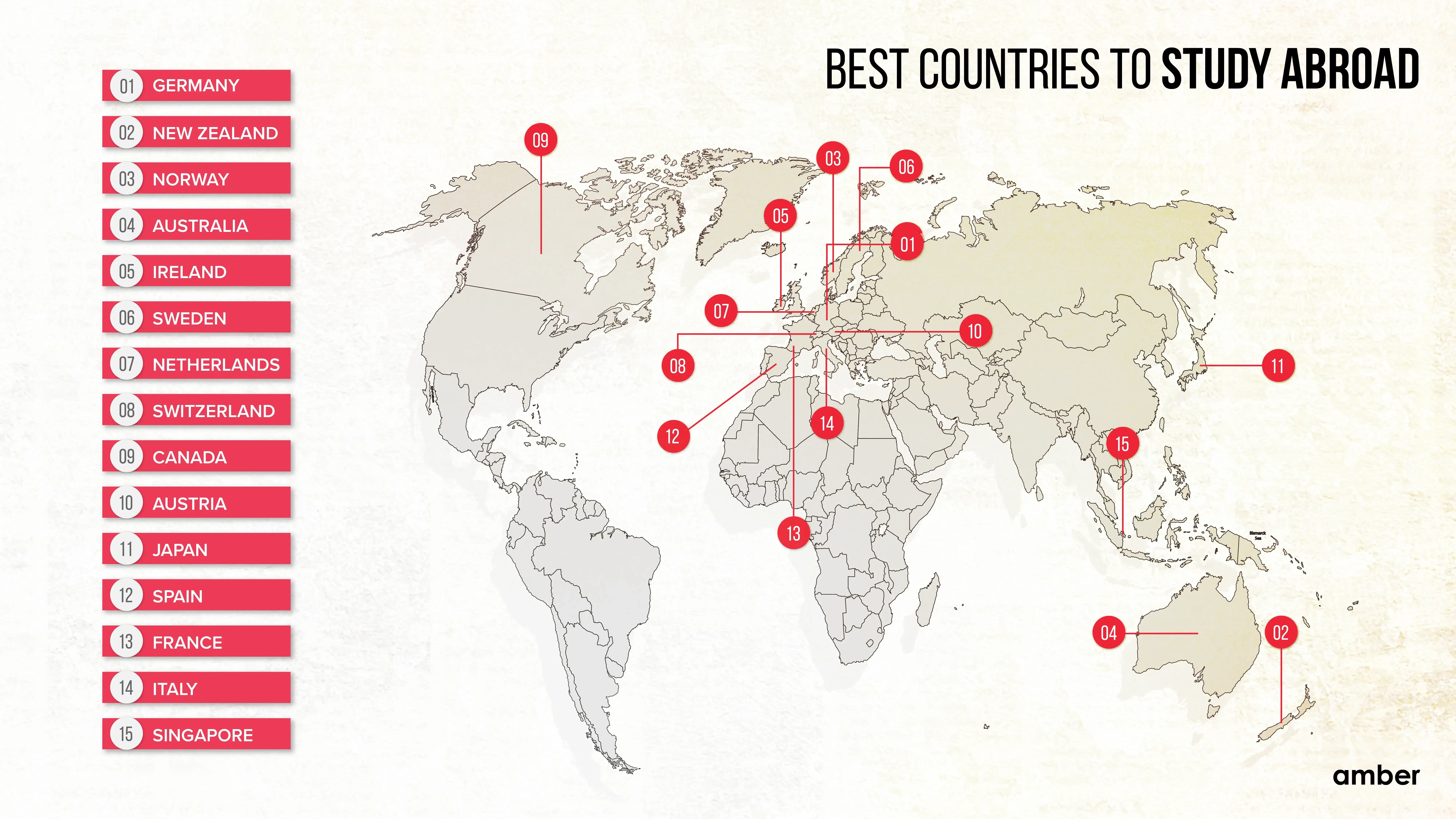Choosing the Right Study Destination: A Comprehensive Guide to Top Education Hubs Worldwide
Date: 10th October, 2025
Selecting the perfect study destination is one of the most significant decisions
in an international student's journey. While university rankings often dominate
the conversation, the ideal choice involves a careful balance of academic quality,
living costs, career opportunities, cultural compatibility, and personal growth
potential. At Navon Study International, we believe the right destination can
transform your educational experience from merely studying abroad to truly
thriving internationally.
This comprehensive guide explores the key factors to consider when choosing your
study destination, providing detailed insights into top education hubs worldwide
and practical frameworks for making this life-changing decision.
1. Understanding Your Personal and Academic Priorities
Before comparing countries, it's essential to clarify what matters most to you
personally and academically. Your ideal destination should align with both your
educational goals and lifestyle preferences.
Key Considerations:
-
Academic Specialization: Certain countries excel in specific
fields—engineering in Germany, business in the UK, technology in the United States,
or hospitality in Switzerland.
-
Learning Style Preferences: Consider whether you thrive in
theoretical, research-focused systems or prefer practical, industry-oriented approaches.
-
Language Requirements: Assess your willingness and ability to
study in a foreign language versus preferring English-taught programs.
-
Climate and Geography: Your personal comfort with different
climates and living environments can significantly impact your overall experience.
-
Career Aspirations: Different destinations offer varying post-study
work opportunities and industry connections in your field of interest.
2. Top Education Hubs: Regional Strengths and Specializations
Each major study destination offers unique advantages and specializations.
Understanding these regional strengths can help you match your goals with
the right educational environment.
Regional Analysis:
-
North America: Known for flexible education systems,
strong research opportunities, and diverse campus communities. The United
States leads in technology and innovation, while Canada excels in
immigration pathways and quality of life.
-
Europe: Offers affordable or tuition-free education in
many countries, rich cultural experiences, and excellent public transportation.
Germany stands out for engineering, the UK for business and humanities,
and the Netherlands for English-taught programs.
-
Asia-Pacific: Combines academic excellence with growing
economic opportunities. Australia and New Zealand offer work rights and
beautiful landscapes, while Singapore and Hong Kong provide global business
connections.
-
Emerging Destinations: Countries like Malaysia, South Korea,
and the United Arab Emirates are investing heavily in higher education,
offering modern facilities and unique cultural experiences at competitive costs.
3. Financial Considerations: Tuition, Living Costs, and Funding
Understanding the full financial picture is crucial for sustainable international
education. Costs vary dramatically between destinations and can significantly
influence your choice.
Financial Factors:
-
Tuition Fee Structures: Compare public university costs
in Europe (often low or free) with private institution fees in the US and UK.
-
Living Expenses: Consider accommodation, food, transportation,
and healthcare costs in different cities and countries.
-
Scholarship Availability: Research country-specific and
institution-specific scholarship opportunities for international students.
-
Part-time Work Opportunities: Understand visa restrictions
and practical possibilities for earning while studying.
-
Return on Investment: Evaluate potential salary outcomes
and career advancement opportunities in your field after graduation.
4. Visa Regulations and Post-Study Opportunities
Immigration policies and post-graduation work rights can significantly impact
your long-term plans and should be carefully considered in your destination choice.
Immigration Considerations:
-
Student Visa Requirements: Compare application processes,
financial proof requirements, and processing times across different countries.
-
Post-Study Work Rights: Research how long you can stay
and work after graduation, and pathways to permanent residency.
-
Dependent Policies: If bringing family members, understand
spouse work rights and children's education options.
-
Industry Connections: Evaluate the strength of university
career services and industry partnerships in your field.
5. Cultural Fit and Lifestyle Considerations
Your ability to adapt culturally and enjoy daily life significantly impacts
your overall study abroad experience and academic success.
Lifestyle Factors:
-
Social Integration: Consider how welcoming different
societies are to international students and the ease of making local friends.
-
Food and Daily Life: Assess your comfort with local
cuisine, shopping habits, and daily routines in potential destinations.
-
Health and Wellness Services: Research healthcare systems,
mental health support, and recreational facilities available to students.
-
Safety and Security: Review safety statistics and
practical precautions needed in different cities and countries.
6. Academic Systems and Teaching Methodologies
Educational approaches vary significantly worldwide, and finding a system
that matches your learning style is crucial for academic success.
Educational Differences:
-
Classroom Dynamics: Compare lecture-heavy systems with
more interactive, discussion-based learning environments.
-
Assessment Methods: Understand whether final exams,
continuous assessment, or project work dominates the grading system.
-
Faculty Relationships: Consider the formality of
student-professor relationships and accessibility outside class hours.
-
Research Opportunities: Evaluate undergraduate research
possibilities and graduate research funding availability.
7. Language Considerations and Preparation
Language factors extend beyond classroom instruction to daily life, social
integration, and future career opportunities.
Language Factors:
-
English Proficiency Requirements: Compare IELTS, TOEFL,
or other test requirements across different institutions and countries.
-
Local Language Benefits: Consider the personal and
professional advantages of learning widely spoken languages like Spanish,
Mandarin, or German.
-
Language Support Services: Research availability of
academic writing centers and language learning resources for international students.
-
Bilingual Environments: Some destinations like Singapore,
Switzerland, or Canada offer opportunities to experience multiple languages.
8. Career Prospects and Global Mobility
Your study destination can significantly influence your career trajectory
and global mobility options after graduation.
Career Considerations:
-
University Reputation and Networks: Consider how your
degree will be perceived by employers in your home country and internationally.
-
Alumni Networks: Research the strength and global reach
of university alumni communities in your field.
-
Industry Placement Opportunities: Compare internship
programs, co-op opportunities, and industry connections across destinations.
-
Global Recognition: Understand how qualifications from
different countries transfer and are recognized worldwide.
9. Making the Final Decision: A Step-by-Step Framework
With so many factors to consider, a structured decision-making process can
help you identify your ideal study destination with confidence.
Decision Framework:
-
Phase 1: Self-Assessment: Identify your non-negotiable
requirements and preferred attributes in a study destination.
-
Phase 2: Research and Shortlisting: Create a long list
of potential destinations, then narrow down based on key criteria.
-
Phase 3: In-Depth Comparison: Develop a comparison matrix
evaluating academic, financial, lifestyle, and career factors for your top choices.
-
Phase 4: Consultation and Validation: Seek advice from
education counselors, current students, and alumni from your shortlisted destinations.
-
Phase 5: Final Selection and Preparation: Make your choice
and begin detailed preparation for your selected destination.
10. Alternative Pathways and Emerging Trends
The landscape of international education continues to evolve, with new
pathways and opportunities emerging beyond traditional study destinations.
Emerging Options:
-
Transnational Education: Consider branch campuses and
partnership programs that allow you to earn foreign degrees while studying
in third countries.
-
Hybrid and Online Options: Evaluate blended programs that
combine online study with short-term international residencies.
-
Regional Hubs: Explore studying in emerging education hubs
that offer unique cultural experiences and growing academic reputations.
-
Multiple Destination Programs: Some institutions offer
programs that include semesters in multiple countries, providing diverse
international experiences.
Conclusion: Finding Your Perfect Study Destination Match
Choosing the right study destination is a deeply personal decision that
requires balancing multiple factors to find the best match for your academic,
professional, and personal goals. There is no single "best" destination—only
the best destination for you based on your unique priorities and circumstances.
Remember that your choice of study destination is not just about the years
you'll spend there as a student, but about how that experience will shape
your worldview, expand your opportunities, and influence your future path.
The right destination will challenge you, support you, and ultimately
transform you into a more globally competent and confident individual.
At Navon Study International, we encourage students to look beyond rankings
and reputation to consider the complete picture of what each destination offers.
The most successful international students are those who choose destinations
that align with their values, learning styles, and long-term aspirations,
creating educational experiences that are both personally fulfilling and
professionally advantageous.
Your journey to finding the perfect study destination begins with honest
self-reflection and thorough research. By carefully considering all the
factors outlined in this guide, you can make an informed decision that
sets the foundation for an unforgettable and transformative international
education experience.


